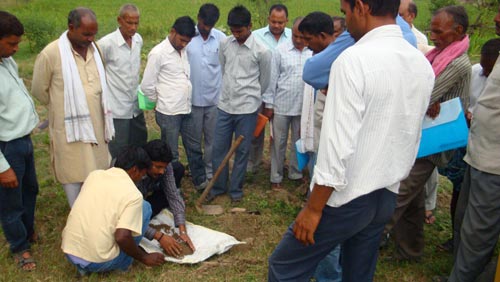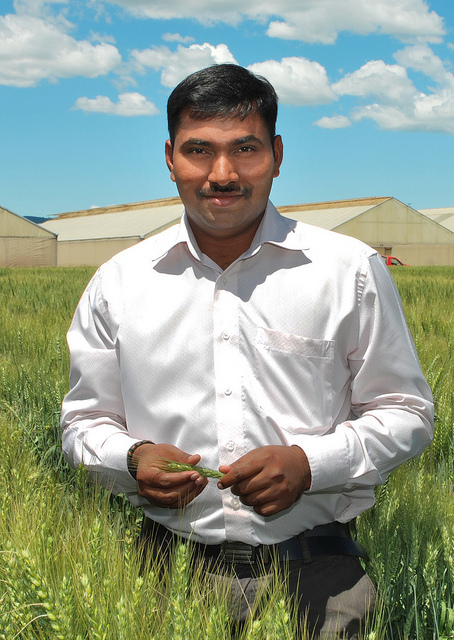 A series of farmer-scientist interaction meetings to create awareness of HarvestPlus and new biofortified wheat varieties with high zinc and iron content, involve farmers in participatory varietal selection (PVS) of biofortified varieties in the next crop cycle, train farmers on soil sampling for iron and zinc analysis, and discuss seed and wheat production technology, took place in eastern Uttar Pradesh, India, in November 2012. The meetings were held in Bhurkura, Mirzapur district, on 4 November, Sota, Chandouli district, on 10 November, and Pidkhir, Mirzapur district, on 18 November, and were attended by 25, 38, and 30 farmers, respectively. They were jointly organized by the Banaras Hindu University, Mahamana Krishak Samiti farmers’ cooperative, Mirzapur district, and CIMMYT, and supported by a private seed company M/s. Shyam Seed.
A series of farmer-scientist interaction meetings to create awareness of HarvestPlus and new biofortified wheat varieties with high zinc and iron content, involve farmers in participatory varietal selection (PVS) of biofortified varieties in the next crop cycle, train farmers on soil sampling for iron and zinc analysis, and discuss seed and wheat production technology, took place in eastern Uttar Pradesh, India, in November 2012. The meetings were held in Bhurkura, Mirzapur district, on 4 November, Sota, Chandouli district, on 10 November, and Pidkhir, Mirzapur district, on 18 November, and were attended by 25, 38, and 30 farmers, respectively. They were jointly organized by the Banaras Hindu University, Mahamana Krishak Samiti farmers’ cooperative, Mirzapur district, and CIMMYT, and supported by a private seed company M/s. Shyam Seed.
Balasubramaniam Arun, Ramesh Chand, and Vinod Kumar Mishra, wheat scientists from the Banaras Hindu University, introduced the HarvestPlus project’s objectives and the importance of biofortified wheat varieties. Chandra Prakash Srivastava explained the role of zinc and iron for human health, while soil scientist Satish Kumar Singh focused on their role and importance in crop production, as well as zinc level distribution in different soil types in the ricewheat growing areas of the region. Each meeting included a hands-on training on HarvestPlus trials sowing, during which farmers learned about experimental design with focus on plot area, number of lines, and amount of seed to be sown, and which included soil samples collection demonstrations. This was followed by a discussion on the use of conventional and zero-till drill for experiment planting, and the farmers’ experience with biofortified varieties, seed purity maintenance, and the use of the progeny row method. Balanced use of nitrogen, phosphorus, potassium, zinc, sulfur, and boron based on soil analysis was also covered.
CIMMYT wheat breeder Arun Joshi described the steps involved in quality seed production and the importance of seed producers’ organizations for small-scale farmers. He also highlighted advantages of the PVS approach, including the increased adoption rate of new varieties within a shorter period of time. Joshi appreciated the keen interest and active participation of farmers in PVS programs and encouraged them to continue their work and facilitate varietal selection to identify and promote agronomically superior biofortified varieties. The participating farmers showed their interest in HarvestPlus experiments and their continuing support for the wheat biofortification program. They expressed their full satisfaction with the interaction meetings, as these help them to build confidence and enhance their knowledge and capacity for understanding new wheat research processes and results. According to the participants, smallholder farmers have achieved significant gains through the participatory research program, an easier access to new varieties being one of them. Sri Hari Kirtan Singh of M/s. Shyam Seed agreed to multiply all lead varieties seeds identified for high zinc and iron content to allow easy access to an even larger number of farmers.
 Capacity development
Capacity development 

